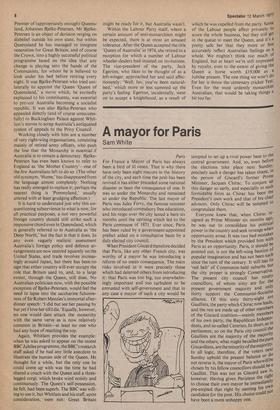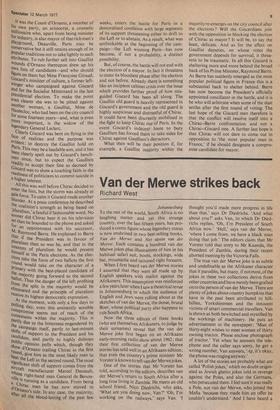A mayor for Paris
Sam White
Paris For France a Mayor of Paris has always been a bird of ill omen. That is why there have only been eight mayors in the history of the city, and each time the post has been revived it has either preceded some national disaster or been the consequence of one. It was so under the Monarchy and remained so under the Republic. The last mayor of Paris was Jules Ferry, the famous minister who introduced compulsory free education, and his reign over the city lasted a bare six months until the uprising which led to the Paris commune of 1871. Ever since, Paris has been ruled by a government-appointed prefect aided on a consultative basis by a duly elected city council.
When President Giscard therefore decided that Paris, like any other French city, was worthy of a mayor he was introducing a reform of no mean consequence. The main risks involved in it were precisely those which had deterred others from introducing it : that Paris was too big, too overwhelmingly important and too turbulent to be entrusted with self-government and that in any case a mayor of such a city would be
tempted to set up a rival power base to the central government. And, so, even before the elections take place next Sunday' precisely such a danger has taken shape, in the person of Giscard's former Prime Minister, Jacques Chirac. To conjure LIP this danger so early, and especially in such formidable form as Chirac has been the President's own work and that of his chief advisors. Only Chirac will be tempted to congratulate them.
. Everyone knew that, when Chirac resigned as Prime Minister six months ago, he was out to consolidate his political power in the country and seek revenge when opportunity arose. It was two bad mistakes by the President which provided him with Paris as an opportunity. Paris, it should he pointed out, is not the left-wing bastion of popular imagination and has not been such since the turn of the century. It still has its 'red belt' of Communist-held suburbs but the city proper is strongly Conservative. The present city council. has ninety councillors, of whom sixty are for the present government majority and .0o.IY thirty support the Communist-Socialist alliance. Of this sixty thirty-eight are Gaullists, the party which Chirac now leads, and the rest are made up of other members of the Giscard coalition—mainly members of his own party, the Republican Endow?' dents, and so-called Centrists. In short, as in parliament, so on the Paris city council the Gaullists are the majority of the majority and the others, what might becalled the p.ure Giscardians, aretheminorityofthemai0fltY. In all logic, therefore, if the voters next Sunday uphold the present balance or do not reverse it, the mayor of Paris who Will be chosen by his fellow councillors should be. a Gaullist. This was not as Giscard saw it, however. Having given Parisians the !telt to choose their own mayor he immediately pre-empted that right by naming his own candidate for the post. His choice could not have been a more unhappy one.
It was the Count d'Ornano, a member of his own party, an aristocrat, a cosmetic millionaire who, apart from being minister for industry, is also mayor of that rich man's Playground, Deauville. Paris may be conservative but it still retains enough of its Popular traditions not to take lightly to such attributes. To rub further salt into Gaullist wounds d'Ornano thereupon drew up his OW n lists of candidates—and who should figure on them but Mme Francoise Giraud, Giscard's minfster of culture, a former leftWinger who campaigned against Giscard and for the Socialist Mitterrand in the last Presidential election. To make the point even clearer she was to be pitted against another woman, a Gaullist, Mme de Hautecloc, who had been on the city council for some fourteen years—and, what is even ,more important, is the widow of the legendary General Leclerc.
Clearly Giscard was bent on flying in the race of realities and the purpose was evident: to destroy the Gaullist hold on Paris. This may be a laudable aim, and it has been clearly spelt out by Giscard's henchmen since, but to expect the Gaullists readily to accept their fate as decreed by Giscard was to show a touching faith in the readiness of politicians to commit suicide in a higher interest.
All this was well before Chirac decided to enter the lists, but the storm was already at gale force. To calm it Giscard made another blunder. At a press conference he described .the coalition's strength as being based on Pluralism,' a fateful if fashionable word. No sooner did Chirac hear it on his television set then he bounded to the phone and asked for an appointment with his successor, M. Raymond Barre. He explained to Barre that if the President was in favour of Pluralism then so was he, and that in the in.terests of pluralism he would present himself at the Paris elections. As the elections take the form of two ballots the first round would take on the character of a Primary with the best-placed candidate of the majority going forward to the second ballot. Thus the danger of the left profiting trOm the split in the majority would be eliminated and the principle of pluralism receive its highest democratic expression. At the moment, with only a few days to Polling day, even this eminently sensible coMpromise seems out of reach of the contestants within the majority. This is Partly due to the bitterness engendered by the campaign itself, partly to last-minute shirts of support to the President and his candidate, and partly to highly dubious Public opinion polls which, though they show d'Ornano trailing Chirac in the first round give him as the most likely man to ue.at the Left in the second round. The most slgnificant shift of support comes from the .aircraft manufacturer Marcel Dassault, Whose right-hand man General de Benou yW Ille is running as a candidate. From being a., Chirac man he has now moved to a Ornano's side. In any case, the majority, after all the blood-letting of the past few
weeks, enters the battle for Paris in a demoralised condition with large segments of its support threatening either to drift to the Left or to abstain. As a result, what was unthinkable at the beginning of the campaign—the Left winning Paris—has now become, if not a probability, a distinct possibility.
But, of course, the battle will not end with the election of a mayor. In fact it threatens to enter its bloodiest phase after the election and not before. Already there is something like an incipient cabinet crisis over the issue which provides further proof of how misguided Giscard has been all along. The Gaullist old guard is heavily represented in Giscard's government and the old guard is highly suspicious and distrustful of Chirac. It could have been discreetly mobilised in the fight to keep Chirac out of Paris. In the event Giscard's indecent haste to bury Gaullism has forced them to take sides for Chirac against Gaullism's detractors.
What then will be their position if, for example, a Gaullist majority within the majority re-emerges on the city council after the elections? Will the Giscardians join with the opposition in blocking the election of Chirac as mayor? It will be, to say the least, delicate. And as for the effect on Gaullist deputies, on whose votes the government depends for survival, it threatens to be traumatic. In all this Giscard is sheltering more and more behind the broad back of his Prime Minister, Raymond Barre. As Barre has suddenly emerged as the most popular political figure in France this is a substantial back to shelter behind. Barre has now become the President's officially appointed conciliator in the battle, and it is he who will arbitrate when some of the dust settles after the first round of voting. The last hope of the Giscard men therefore is that the conflict will resolve itself into a Chirac—Barre confrontation and not a Chirac—Giscard one. A further last hope is that Chirac will not dare to come out in opposition to 'the most popular man in France,' if he should designate a compromise candidate for mayor.







































 Previous page
Previous page